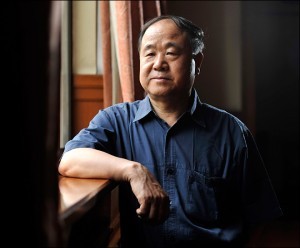The Nobel Prize for Literature to Chinese writer Mo Yan (a pseudonym for Guan Moye) appears in the eyes of the Swedish foundation a greatly deserved tribute. The prize’s website notes in its bio of Mo:
Through a mixture of fantasy and reality, historical and social perspectives, Mo Yan has created a world reminiscent in its complexity of those in the writings of William Faulkner and Gabriel García Márquez, at the same time finding a departure point in old Chinese literature and in oral tradition. In addition to his novels, Mo Yan has published many short stories and essays on various topics, and despite his social criticism is seen in his homeland as one of the foremost contemporary authors.

But Mo’s worthiness, while lauded by Chinese state media, has come under question in China by some of the literati and press. The day before the prize announcement, China Daily said:
Speculations have been running thicker than the holiday traffic in China about the possibility of a Chinese writer nabbing the upcoming Nobel Prize for Literature. No, these aren’t about the likelihood of Mo Yan winning the prestigious honor – that’s being taken care of by professional betting houses – but, rather, they’re about the worthiness of bestowing the honor on him.
The Chinese news site SINA’s headline stated, “Does Mo Yan deserve a Nobel nod?”
China Daily notes, “…a distinct voice emerging from intelligentsia says Mo is too close to the establishment to merit the Nobel, which, in their minds, is a testament to independence not only in thinking but also in posture.”
The paper quotes the sarcastic swipe by writer Li Yong, who uses the pen name Shinian Kanchai: “It would be a perfect world if the winner of the Mao Dun Literary Award and a government award also end up with the Nobel.”
The writer Yefu predicted flatly before the prize announcement, “The Nobel will not go to a writer who sings the praise of authoritarianism. That is an essential principle.”
The paper notes Mo received “an avalanche of censure” from dissident writers when he copied “a Mao Zedong speech given 70 years ago that largely set the parameters for China’s arts and literature in the ensuing decades. Mo was one of 100 writers and artists who hand-copied paragraphs from the long speech, published in a commemorative book.” To liberal circles, with that action Mo had burrowed in as a puppet of the state.
